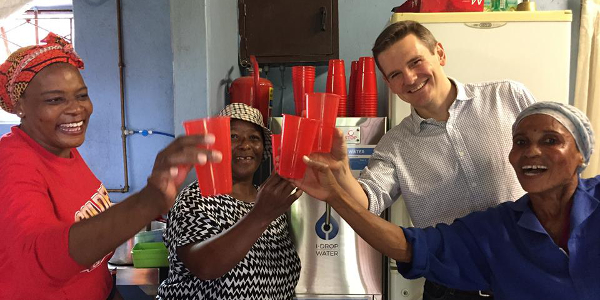
James Steere (third from left)
South Africa has over the last few years experienced water shortages that led to it not being able to provide reliable water supply to almost two million people between 2011 and 2015.
James Steere is a visionary with an Oxford University degree who has taken it upon himself to come up with an innovative solution to the water crisis. His company, I-Drop Water is a for-profit social enterprise that designs, builds and installs drinking water purification and dispensing machines in grocery stores at no cost, sharing income generated from water sales with store owners.
I-Drop Water has so far installed purification and dispensing units in over 55 locations in South Africa, Botswana, Zimbabwe and Ghana and helped shop owners save almost 995,000 litres of water and over 1,300 kilogrammes of plastic waste associated with traditional bottled-water alternatives.
“I sincerely believe in the need for sustainable solutions, and the opportunity exists to create long-term, value-generative solutions through traditional, tested business models and wisdom,” comments Steere. “We are trying to create a future where access to clean, safe drinking water is no longer a dream.”
I-Drop Water was founded in 2015 but is already transforming the way safe drinking water is bought and sold in southern Africa, a phenomenal accomplishment that saw the company announced as the winner of the South African version of Chivas Regal’s The Venture III, a global search to find, mentor and support burgeoning start-ups that are dedicated to making a difference in their communities.
Comments
Post a Comment